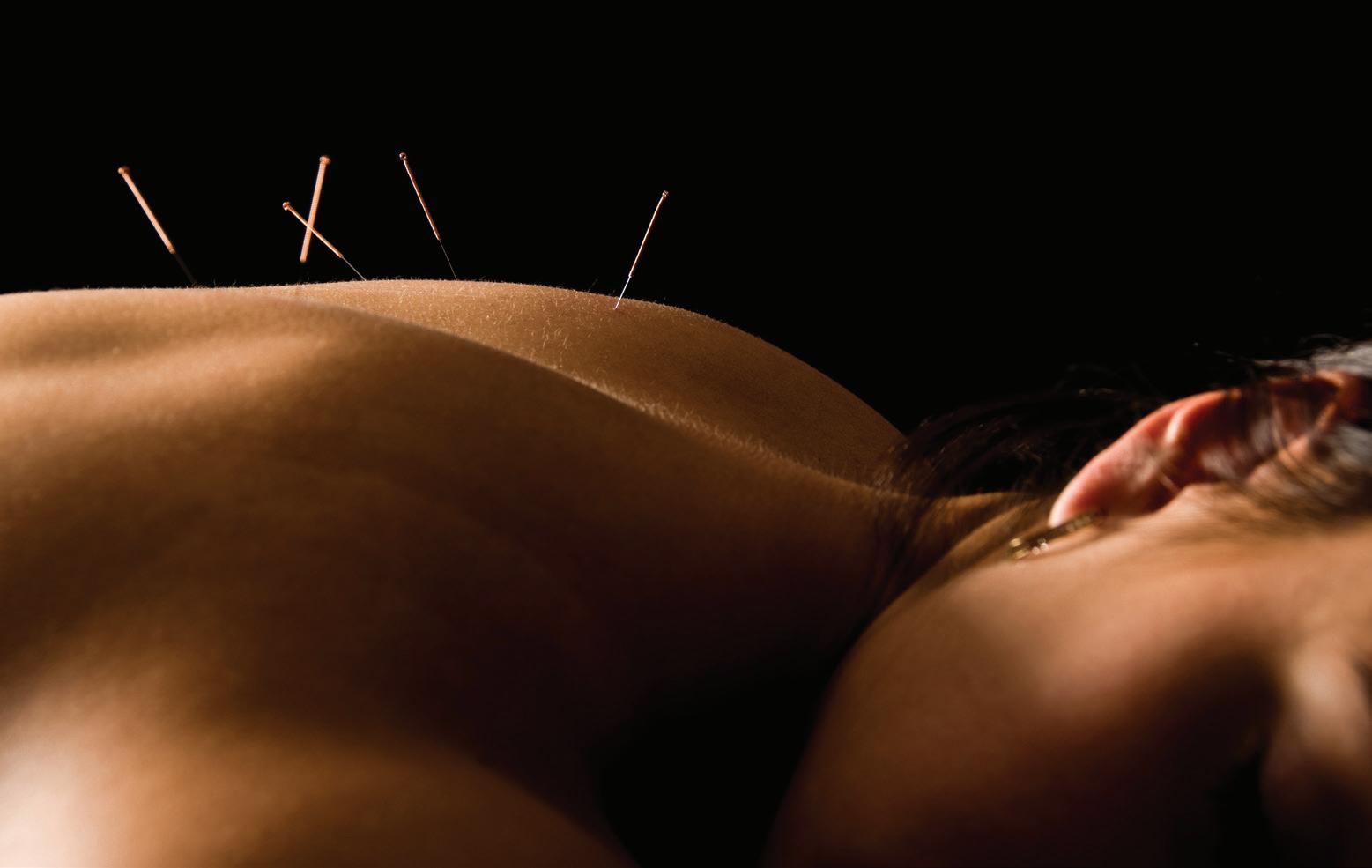
12 minute read
Perimenopause

MAngelina Jolie disclosed that she underwent elective surgery at 39 to remove her ovaries and fallopian tubes because of her high risk of ovarian cancer, causing her to go into early menopause immediately.
ost women are familiar with menopause. We were taught about menstrual cycles and getting pregnant in sex ed classes at school, but nobody told us about perimenopause. Our mothers certainly didn't want to talk about menopause, yet it's affecting women who have not even had their first child. Did you know that more than 1 million women in the United States experience menopause each year? Every woman should have more access to information on this subject.
Perimenopause is the period before menopause when your body makes less estrogen. Estrogen is an essential hormone for the health of your reproductive system. It also affects your mental and physical well-being, as it helps regulate mood and maintain bone density. During perimenopause, a woman's ovaries gradually stop releasing eggs. At this time, estrogen levels begin to drop, which can lead to symptoms like hot flashes and vaginal dryness. When a woman is no longer ovulating, she reaches menopause. At this point, her ovaries stop producing estrogen and progesterone. Some women go through menopause naturally, while others experience surgical removal of the ovaries.
But perimenopause doesn't just mean that you'll be getting more PMS-related annoyances—it also means that your body may send confusing signals. It's normal to experience these changes in mood during perimenopause because they're related to hormones. Every woman experiences this phase differently; some may not even know they're going through it since their symptoms aren't as severe as others. Many women also experience uncomfortable symptoms during menopause later in life after all traces of estrogen have left their bodies entirely.
When does it start?
The symptoms of perimenopause usually start a few years before menopause, but they can be difficult to distinguish from other things that may be going on in your life. For example, stress and anxiety can cause many of the same symptoms as perimenopause, so it’s important to talk with your doctor if you think something is wrong.
While perimenopause often occurs between ages 45 and 55, not all women experience it, and perimenopause can even start as early as age 35. Medical experts suggest there's no set age for you to go through it.
Most experts agree that once you've passed through this phase of change in your life, you can expect, on average, about a year left before entering full-blown menopause around age 51 years old. It is when your ovaries stop producing eggs, and your menstrual cycle comes to a stop. Menopause is a natural part of aging but can be affected by surgery, chemotherapy, or radiation treatment.
Can I still get pregnant?
Perimenopause is the period when your body begins to make changes that eventually lead to menopause. During this time, your ovaries produce less estrogen and progesterone, making it more difficult to become pregnant. This is a normal part of aging; however, if you are younger than 40 years old or have not yet gone through menopause, it's important to see a doctor right away.
What are the signs and symptoms?
Many women experience changes in their menstrual cycle, such as irregular periods, bleeding between periods or after sex, and heavy bleeding during periods or clots.
These may be signs of perimenopause if they occur suddenly after several years of regular cycles or if you have had no change in your cycle for many years. It’s important to keep in mind that not all women experience these signs and symptoms. Some women may only experience one or two of these symptoms, while others may find them happening at different times throughout their menstrual cycle. The symptoms of perimenopause fall into two categories: physical and psychological. Physical symptoms include hot flashes, night sweats, sleep disturbances, vaginal dryness or pain during sex (dyspareunia), mood swings and fatigue. Hormonal changes can cause other problems, such as headaches, dizziness and blurred vision.
Insomnia: Some women experience changes in their sleep patterns as they transition into perimenopause. The amount of time it takes you to fall asleep may increase while the amount of time you spend sleeping decreases. You may also find that waking up at night is more common during this time.
Appetite Changes: Some women experience changes in their eating habits during perimenopause, often due to fluctuations in hormone levels. You may find yourself craving foods you don't normally eat, or you may be more likely to overeat than usual.
Sexual Health: Some women experience a decrease in their sex drive during perimenopause, while others may find that their desire for sex increases. Your level of sexual interest may fluctuate throughout this time as well.
Mood Changes: Some women experience mood changes during perimenopause, while others do not. If your moods are more easily affected by stress or emotion than they used to be, this could signify hormonal fluctuations. You may also notice that you feel more irritable and have sudden bursts of anger or crying spells for no apparent reason.
Vasomotor Symptoms: Hot flashes or night sweats are often considered the most common indicators of perimenopausal changes. Hot flashes feel like a sudden wave of heat, which may increase heart rate or palpitations. Night sweats occur at bedtime and may cause you to wake up sweaty and need to change your clothes and sheets.
What are some complications of perimenopause?
Osteoporosis. As estrogen levels drop, your bones may lose density and become more prone to fracture.
Heart disease. Lower estrogen levels can increase your risk for heart disease in the years after menopause when most women begin to develop heart problems.
High blood pressure (hypertension): The decrease in estrogen causes fluid retention that can lead to high blood pressure, especially if you're overweight or have other risk factors for hypertension (such as diabetes or kidney disease). If you have high blood pressure before menopause, your BP will likely increase even more during perimenopause and post-menopause as well; this puts you at greater risk for stroke, heart attack and other cardiovascular events.
Cancer: Research suggests hormonal changes in perimenopausal women may increase their chances of developing certain cancers such as endometrial, breast, or ovarian cancer—but not all studies agree on this association or what level of risk they pose overall.
How is it diagnosed?
It may be challenging to tell if you are having symptoms of perimenopause. A physical exam along with your medical history, menstrual history and age may help your provider make a diagnosis. Blood tests measuring hormone levels can also aid in a proper diagnosis. Menopause occurs when 12 months have passed without a menstrual bleed.
At-home test kits are also available. The Reveal Home Menopause Test is a urine test that detects FSH (follicle-stimulating hormone) in the urine. The Thorne Menopause Test is a saliva test that measures various hormone levels such as cortisol, testosterone, estradiol, progesterone and DHEA (dehydroepiandrosterone). The Perimenopause test (everlywell.com) measures FSH, estradiol and LH (luteinizing hormone) in a blood sample.
However, these tests may be misleading because hormone levels may fluctuate.


“There is not a lot of conversation about menopause. I'm going through it, and I know all of my friends are going through it. And the information is sparse.” – Michelle Obama How long does it last?
Some women only experience symptoms for a few months or years, while others may have them for many years before moving into menopause. The length of time you experience perimenopausal symptoms is different for everyone and can be affected by factors such as age, lifestyle choices and other health issues.
While menopause is the permanent end of your ability to have children, it's important to know that perimenopause can take years to complete. Though the average length of time between when a woman starts having symptoms and when she reaches menopause is about 5-7 years, some women experience as little as three years or as many as ten years of hormonal changes before reaching menopause. Perimenopause is not a disease; it's simply a transition between your reproductive years and post-reproductive life.
How to treat perimenopause symptoms
You can't prevent perimenopause or stop it from happening, but you can take steps to help manage your symptoms and feel your best during this phase. One way to treat perimenopause symptoms is with lifestyle changes. For example, you can manage stress levels by sleeping more regularly, exercising regularly and eating a balanced diet.
Talk to your doctor about hormone therapy options if you have tried these lifestyle changes but are still struggling with menopause-related symptoms. Your doctor may recommend that you take HRT (hormone replacement therapy), which contains estrogen and progesterone medications that replace the hormones that decline during perimenopause.
Systemic estrogen therapy, available in multiple dosage forms, is the most effective treatment option for relieving hot flashes and night sweats. Estrogen may also be beneficial in preventing bone loss.
Vaginal estrogens are helpful for the treatment of vaginal dryness, painful intercourse, and other urinary symptoms.
According to the National Institute on Aging, “study findings showed that cognitive behavioral therapy for insomnia improved sleep in women with menopausal sleep problems. The therapy sessions, six individual sessions over eight weeks, covering topics such as strengthening the association between bed and sleep and improving bedtime routines.”
Certain antidepressants have also improved menopausal symptoms, such as hot flashes and insomnia.
Gabapentin is approved to treat seizures, but it has also helped to reduce hot flashes and treat migraines.
Over-the-counter medications include water-based lubricants or moisturizers to help with vaginal discomfort.
Researchers are looking into alternative therapies to determine their safety and effectiveness, but the evidence still needs to be provided.
Natural supplements include black cohosh, chaste berry, evening primrose oil and phytoestrogens. Always talk with your doctor before taking any herbal or dietary supplements for perimenopausal or menopausal symptoms. The FDA does not regulate herbal products; some can be dangerous or interact with other medications you take, putting your health at risk.


Naomi Watts said, “I began my hormonal transition into perimenopause in my late thirties and menopause in my early forties. It was such a lonely and shameful experience. There was no community and no one to talk to.” Her menopausal experience prompted her to launch her new beauty and wellness brand Stripes. The brand's 11-piece menopausal beauty collection addresses the skin and hair changes associated with early menopause. It also includes supplements and other products.
Skincare isn't the only focus of the menopause economy. Telehealth companies are coming to the forefront, along with hot-flash-friendly clothing. Wellness travel destinations now offer menopause retreats with amenities and offerings to help women cope with physical and emotional challenges.
Low-risk alternative therapies include acupuncture, pelvic floor therapy, reiki and meditation.

Acupuncture
Acupuncture stimulates the release of endorphins, natural painkillers your body produces. It has been used in China for thousands of years and has become increasingly popular in western medicine as a treatment for many conditions, including chronic pain, arthritis and insomnia.
There are many ways acupuncture works as a treatment for hot flashes, such as reducing the frequency and intensity. Many women with perimenopause experience insomnia due to the associated stress and anxiety, and acupuncture can help promote restful sleep by alleviating these feelings.
Pelvic Floor Therapy
Pelvic floor therapy is physiotherapy that focuses on strengthening muscles around the pelvis and pelvic floor. The pelvic floor muscles support the bladder, bowel, uterus, and rectum and are an important part of overall health for women who are entering perimenopause. Although not all women experience problems with their pelvic floor muscles with perimenopause, those who do can benefit from treatment using manual therapy techniques, including stretching exercises and massages to strengthen these muscles.
Reiki
Maaliyah Papillion, a local reiki practitioner at Spyre Center, had this to share:
Q: What is reiki? A: Reiki is an alternative method of healing called energy healing. It is administered by a skilled practitioner who can help you experience this healing energy using their hands. Many seek the benefits of reiki to combat stress, anxiety, ailments and emotional trauma or pain. Reiki treats the whole person, mind, body and soul.
Q: How long have you been practicing? A: 4 years, but reiki has been a part of my regular healing routine for over a decade.
Q: A study was completed to determine the effect of reiki on menopausal symptoms. Have you used reiki to help alleviate symptoms that are caused by stress? A: Yes, I use reiki to help my clients manage stress regularly. Because of reiki's ability to balance the energy centers or chakras within our bodies, this work is excellent for restoring peace and mental clarity.
Q: How do the chakras affect hormone balance? Which chakra would be blocked? A: Although there is no direct correlation between hormone levels and balanced chakras, it is important to note that when these centers are out of balance, we can feel physical symptoms because of it. For instance, the sacral chakra is housed in our sacrum and is responsible for our creativity, emotions, and senses. An imbalance could show up as having a lack of creativity in your life, pain or stiffness in your back, or lack of sexual drive or reproductive issues.
Spyre Center
Spyre Center is a local wellness center with practitioners who offer therapies that may help manage perimenopausal symptoms. Treatments include Ayurveda, Bodywork + Energy Healing, Integrative Medicine, Acupuncture and Pelvic Floor Therapy. For more information visit mindbodyonline.com. Transitioning to perimenopause can be challenging, but it's also important to remember that you're not alone. The best thing you can do is educate yourself about the signs of perimenopause, so when they happen, you'll know what to expect and how to deal with them—and feel less stressed out in the process! Perimenopause is a normal part of life that every woman should learn more about because it affects everyone differently.











